Singapore has reported a total of 38 Coronavirus new cases as of noon today (May 18), including 11 imported cases. Of the 27 community cases, 16 were linked to previous cases or clusters while 11 were unlinked. The country has managed to bring down the daily cases to double digits since August 2010, something that neighbouring Malaysia can only watch with envy.
As compared to Malaysian government that has announced yet another record 47 deaths from Covid-19 today, not to mention 4,865 new infections, Singapore is indeed a success story. But Singapore new Health Minister Ong Ye Kung has no intention of resting on his laurels. There’s a bigger problem ahead, which even Malaysia might not realize – Indian “B.1.617” variant.
Four days ago, Singapore decisively returned to a lockdown-like conditions it last imposed a year ago for weeks, effective from May 16 to June 13. Despite only 52 new Covid cases on Friday (May 14), the tiny red dot had refused to take any chances, banning dining-in and limiting gatherings to two people. Unlike Malaysia, the standard operating procedure (SOP) is very clear.

Besides household visitors are being cut to a maximum of two people from five people, working from home will be the default. By Sunday (May 16), new cases dropped to 38, but all primary, secondary, junior college and some pre-university students were ordered to shift to full online learning. It is the most restrictive since last April’s partial lockdown called the circuit breaker.
Today, the Singapore government has announced a new strategy in anticipation of the double mutant strain which was first detected in Maharashtra, India. On top of approving those in the age group of 12-to-15 for Coronavirus vaccination, the health minister said effective tomorrow (May 19), the country will delay the administration of second Covid-19 vaccine doses.
It means people who have registered for the vaccination program will have their second dose delayed by 3 to 4 weeks – or double the time – from the original schedule. Hence, instead of 3 to 4 weeks wait for the second dose after taking the first, people will now have to wait for 6 to 8 weeks instead. The strategy is to free up the resources to vaccinate those aged 40 and 44.
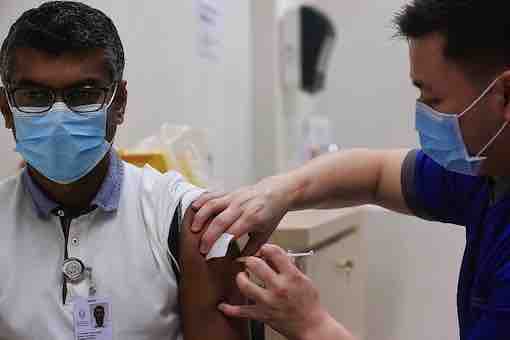
Essentially, the change in vaccination strategy will see 400,000 more people in Singapore are given at least one vaccine dose by the end of July. The objective is to cast the net wide so that more people are protected in the shortest time. Interestingly, the new strategy means virtually all Singapore residents would get at least one dose by August this year.
Health Minister Ong said – “If all goes smoothly, 4.7 million individuals will be covered by at least one dose of vaccination by August and this will substantively cover almost all our eligible population”. The current recommendations say the second dose of the Pfizer-BioNTech vaccine is to be taken 21 days apart, while Moderna is 28 days between first and second doses.
Obviously, Singapore’s latest strategy has been taken from the UK’s playbook. Yesterday, the United Kingdom said goodbye to lockdown after months of restrictions. England, Scotland and Wales can now meet in groups of up to 30 outdoors and pubs and restaurants are able to serve customers indoors. Recreational venues such as cinemas, museums, theatres and concert halls can also reopen.
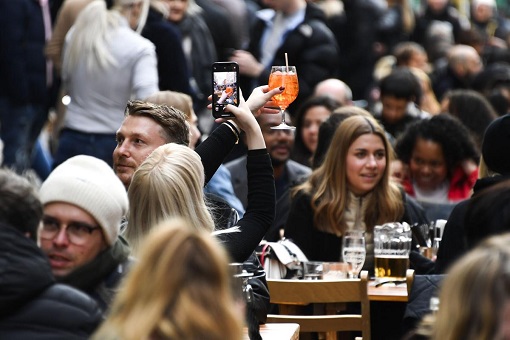
With 128,000 total deaths, the UK has the highest reported Covid-19 fatalities in Europe. Britain saw its death toll topped 1,800 in a single day in January. But on Friday (May 14), the same day Singapore imposed the lockdown-like conditions, Britain recorded only 17 deaths. And from nearly 70,000 new daily Covid cases, Britain’s average new infections have plunged to around 2,000 a day.
While the UK is nowhere near as competent as Singapore in managing and containing the pandemic, it’s nevertheless a spectacular achievement that it had managed to bring down the fatality from 1,800 to 17 deaths, and reduce new infections from 70,000 to 2,000 since January this year. More importantly, Britain’s bold and innovative strategy works like a charm.
And it was the Britain’s strategy in January, delaying the second dose of the Covid vaccine by up to 12 weeks (3 months) to prioritise first jabs to as many people as possible, that has impressed upon the Singapore government. The bold move to give priority to first-timer the first vaccine dose quickly has resulted in the huge drop of new cases and deaths in the UK.
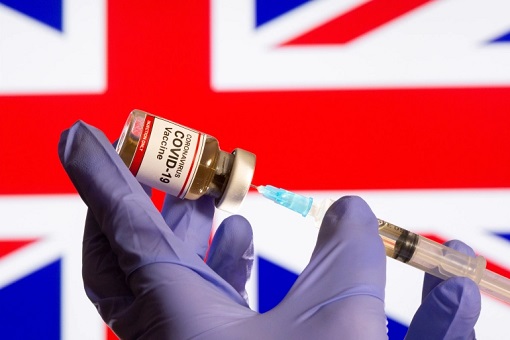
Singapore hopes the combination of a lockdown and the new strategy could protect all its people by August before the Indian variant could do any serious damage. The 6 to 8 weeks delay is clearly shorter than the UK’s 12 weeks. Therefore, if it works in Great Britain, it should work in Singapore, despite Pfizer and Moderna’s recommendation of between 21 to 28 days between the doses.
Dr Robert Wachter, from the University of California’s Department of Medicine, said – “You’ll save far, far more lives – on the order of tens of thousands more lives – giving those extra vaccine doses to people for their first shot, getting them from zero to 85% protected, than using that same capacity for giving people their second shot and getting them from 85% to 95% efficacy.”
But Singapore isn’t the second country that copies Britain’s vaccination model. Taking a page from British’s success, Denmark in April approved a delay of up to 6 weeks between the first and second shots of its Pfizer and Moderna vaccines. Norway also followed suit, extending the interval between the first and second jabs from 6 to 12 weeks for adults under 65 years old.
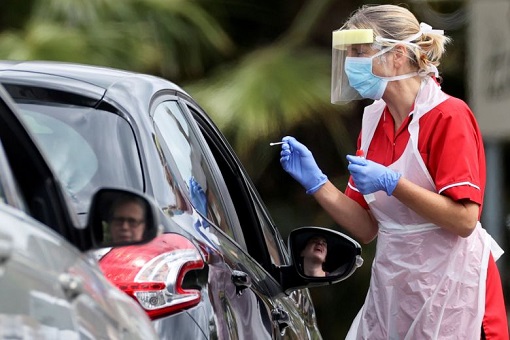
Likewise, the French government has delayed the second jab from four weeks to six weeks in order to vaccinate more quickly without reducing protection. In March, Canada, in an effort to tackle short supply of vaccines, allowed provinces to extend the time between first and second doses to a maximum of four months – longer than the UK’s 12 weeks.
The U.S. CDC (Centres for Disease Control and Prevention) has updated its guidance to allow up to 42 days (6 weeks) between doses of the Pfizer and Moderna vaccines. Even though Pfizer said there is no clinical evidence to support Britain’s stunning strategy, the results show it offer protection against death to thousands of people.
Even then, scientists have warned that the Covid-19 variant from India could become the dominant strain in the country in a matter of days. Yesterday, British Health Secretary Matt Hancock told British lawmakers that there were 2,323 cases of the Indian variant B.1.617.2 (a sub-lineage of B.1.617) in Britain, up from 1,313 last Thursday – a jump of 77%.
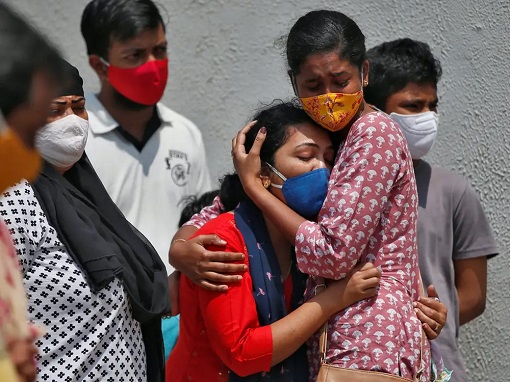
According to the worst case scenario modelling built by SAGE (Scientific Advisory Group for Emergencies), if B.1.617.2 were 40-50% more transmissible than the U.K. or “Kent” version (known as B.1.1.7), it could trigger an increase in hospitalizations worse than January 2021 in Britain. Countries that are still dragging its feet like Malaysia could be in deep trouble.
Other Articles That May Interest You …
- Taliban Hadi Should Learn This – How UK Says Goodbye To Lockdown After Covid Cases Drop From 70,000 to 2,000
- Congrats Muhyiddin – Angry Malay Voters Want To Teach The Government A Lesson At The 15th General Election
- India’s Super-Rich Flee As Covid Cases Skyrocket To New World Record – How It Goes From Bad To Worse In 2 Weeks
- EU Finally Admits AstraZeneca Covid-19 Vaccine Can Cause Blood Clots – And UK Recommends Get Other Vaccines
- South Africa Suspends “Ineffective” Oxford-AstraZeneca Covid-19 Vaccine – Plans To Sell It And Use J&J Instead
- How We Could Have Done Better – Singapore Reveals Lessons That Malaysia Could Learn To Fight Covid-19
- Forget UK’s Covid-19 Variant – This South African Coronavirus Variant Is Deadlier And Can Spread Even Faster
- Identify, Investigate, Negotiate – As Malaysia Struggles, Neighbour Singapore Reveals How It Speedily Gained Covid-19 Vaccine
- Mistake Or Cheating? – AstraZeneca-Oxford Admits Manufacturing Error In Its Vaccine Effectiveness Results
- Coronavirus – Here’s How China Is Back To Normal While The U.S. And Europe Are Getting From Bad To Worse
- 3 Coronavirus Variants Discovered – Surprisingly, “Type-A” Found In Americans, Wuhan’s Type-B And Type-C In Europe

|
|
May 18th, 2021 by financetwitter
|


|

|

|

|

|

|




























Comments
Add your comment now.
Leave a Reply